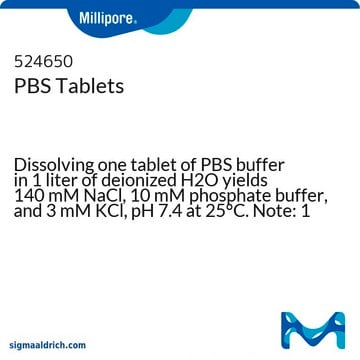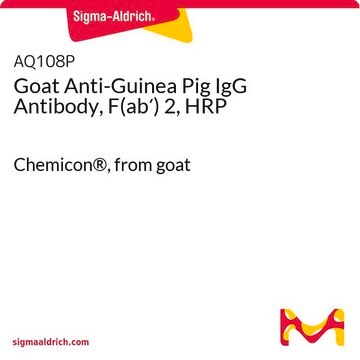Products may be shipped at a different temperature than the recommended long-term storage temperature. If the product quality is sensitive to short-term exposure to conditions other than the recommended long-term storage, it will be shipped on wet or dry-ice. If the product quality is NOT affected by short-term exposure to conditions other than the recommended long-term storage, it will be shipped at ambient temperature. As shipping routes are configured for minimum transit times, shipping at ambient temperature helps control shipping costs for our customers. For more information, please refer to the Storage and Transport Conditions document: https://www.sigmaaldrich.com/deepweb/assets/sigmaaldrich/marketing/global/documents/316/622/storage-transport-conditions-mk.pdf
Fontos dokumentumok
P4809
Phosphate-Citrate Buffer
tablet
Szinonimák:
PCR Buffer
Méret kiválasztása
52 800,00 Ft
Méret kiválasztása
About This Item
52 800,00 Ft
Javasolt termékek
Forma
tablet
Minőségi szint
pH
4.5-5.5 (1 tablet/100mL in water)
oldhatóság
water: soluble
tárolási hőmérséklet
room temp
Általános leírás
Alkalmazás
- Characterization of nettle leaves (Urtica dioica) as a novel source of protease for clotting dromedary milk by non-destructive methods.: This study uses phosphate-citrate buffer in the enzymatic extraction processes to maintain stability and activity of plant-derived enzymes, demonstrating its crucial role in the development of natural coagulants for dairy products (Bouazizi et al., 2022).
- A rapid, low pH, nutrient stress, assay to determine the bactericidal activity of compounds against non-replicating Mycobacterium tuberculosis.: Utilizing phosphate-citrate buffer, this study develops a low pH nutrient stress assay for evaluating the efficacy of antibacterial agents against dormant tuberculosis bacteria, providing a critical tool for drug development (Early et al., 2019).
- Measurement of Free Iodine in Different Formulations of Povidone-Iodine Eye Drops 5.: This investigation uses phosphate-citrate buffer to measure the stability and release of iodine in ophthalmic solutions, highlighting its importance in ensuring the efficacy and safety of eye care products (Prado et al., 2019).
Feloldás
Figyelmeztetés
Warning
Figyelmeztető mondatok
Óvintézkedésre vonatkozó mondatok
Veszélyességi osztályok
Eye Irrit. 2 - STOT SE 3
Célzott szervek
Respiratory system
Tárolási osztály kódja
11 - Combustible Solids
WGK
WGK 3
Lobbanási pont (F)
Not applicable
Lobbanási pont (C)
Not applicable
Válasszon a legfrissebb verziók közül:
Analitikai tanúsítványok (COA)
Nem találja a megfelelő verziót?
Ha egy adott verzióra van szüksége, a tétel- vagy cikkszám alapján rákereshet egy adott tanúsítványra.
Már rendelkezik ezzel a termékkel?
Az Ön által nemrégiben megvásárolt termékekre vonatkozó dokumentumokat a Dokumentumtárban találja.
Az ügyfelek ezeket is megtekintették
-
How is shipping temperature determined? And how is it related to the product storage temperature?
1 answer-
Helpful?
-
-
How can I determine the shelf life / expiration / retest date of this product?
1 answer-
If this product has an expiration or retest date, it will be shown on the Certificate of Analysis (COA, CofA). If there is no retest or expiration date listed on the product's COA, we do not have suitable stability data to determine a shelf life. For these products, the only date on the COA will be the release date; a retest, expiration, or use-by-date will not be displayed.
For all products, we recommend handling per defined conditions as printed in our product literature and website product descriptions. We recommend that products should be routinely inspected by customers to ensure they perform as expected.
For products without retest or expiration dates, our standard warranty of 1 year from the date of shipment is applicable.
For more information, please refer to the Product Dating Information document: https://www.sigmaaldrich.com/deepweb/assets/sigmaaldrich/marketing/global/documents/449/386/product-dating-information-mk.pdfHelpful?
-
-
Can this tablet be used for coagulation of. Milk for making cheese
1 answer-
This product is intended primarily for laboratory research purposes unless otherwise stated. This product not to be used for any other purposes, including but not limited to, in vitro diagnostic purposes, in foods, drugs, medical devices or cosmetics for humans or animals or for commercial purposes.
Helpful?
-
Active Filters
Tudóscsoportunk valamennyi kutatási területen rendelkezik tapasztalattal, beleértve az élettudományt, az anyagtudományt, a kémiai szintézist, a kromatográfiát, az analitikát és még sok más területet.
Lépjen kapcsolatba a szaktanácsadással










